10 Sustainable Event Ideas To Ensure Your Next Event Will Be a Hit
Luiz Martins
Nov 28, 2024 9:45:00 AM

As businesses and organizations increasingly work to reduce their environmental impact, hosting and participating in sustainable events is becoming more important than ever. By incorporating sustainable practices into your event planning, you can help protect the environment, set your event apart from other events, and create a more memorable and meaningful experience for your attendees. Whether planning a conference, trade show, or another type of event, there are many ways to make your event more sustainable and green.
Let's get started.
In-person events come with a significant carbon footprint, with local and regional travel—particularly air travel—being the largest contributor. Other key factors that add to the environmental impact include:
Here are actionable strategies for event organizers and planners to reduce their environmental impact and embrace sustainable practices.
There are many ways to make your events more sustainable and environmentally friendly. One option is to use a virtual event platform such as 6Connex, which allows you to host events and webinars online and eliminate the need for attendees to travel. Virtual event tools such as live streaming, digital badges, and automated networking alerts can help you create immersive and engaging event experiences for your virtual attendees.
Hybrid events, which combine elements of in-person and virtual events, can also be a sustainable option. By offering both in-person and virtual components, hybrid events allow attendees to choose the attendance format that is most convenient for them, reducing travel for some and minimizing the event's environmental impact.
In addition to virtual and hybrid events, there are many sustainable practices you can implement to make your events more environmentally friendly. For example, event tech integrations that enable collateral downloads and virtual swag bags can help reduce paper waste and single-use plastic. You can also host your event at an eco-friendly venue and arrange for sustainable transportation options, which can make a significant impact. Mobile event apps can also be a sustainable choice, allowing attendees to digitally access event information and resources, reducing the need for paper agendas, venue maps, and more.
The importance of sustainability has become increasingly evident in recent years, leading to a rise in the demand for eco-friendly events. From conferences to corporate meetings, there are numerous opportunities to make your events more sustainable and environmentally conscious. In the list below, we will discuss various go-green event ideas to help you create a successful and sustainable event that positively impacts the planet while meeting your attendees' needs.
These ideas include selecting eco-friendly venues, partnering with sustainable vendors, offering sustainable transportation options, and more. By incorporating these go-green event ideas, you can create a memorable and meaningful experience that reduces your event's carbon footprint.

Choosing an eco-friendly venue is one of the most effective ways to make your events more sustainable. There are several factors to consider when looking for an eco-friendly venue, including green certification, energy efficiency, water conservation efforts, and waste reduction initiatives.
One way to find an eco-friendly venue is to look for locations with green certification, such as LEED or Green Seal. These certifications indicate that the venue has met specific environmental performance and sustainability standards. In addition to green certifications, you should also consider the venue's energy efficiency. Seek out venues with energy-efficient lighting and appliances and venues that deploy energy-saving measures such as natural lighting or solar panels.
Water conservation is another important consideration when selecting an eco-friendly venue. Look for venues with water-saving features, such as low-flow toilets, waterless urinals, or reclaimed or recycled water. Waste reduction is also crucial for creating a sustainable event, so opt for venues with programs in place for recycling and composting that procure reusable or biodegradable products.
If you would like to host your event at a hotel, consider using websites such as Book Different, Green Globe, and TripZero to help identify environmentally conscious hotels. Many hotels also offer online sustainability reports detailing the hotel's carbon offset programs, energy consumption, linen reuse, and more.
If you cannot locate a venue that meets the above criteria, remember that virtual events are a great way to bypass the sustainability implications of an in-person event and completely guarantee your venue is green. Platforms such as 6Connex make hosting virtual and hybrid events easy without sacrificing the attendees' experience. Check out more in our sustainability report.
A 2023 research found that over 97% of media marketers consider in-person events to be crucial.
Thus, the responsibility of finding accredited venues that adhere to sustainability concepts has fallen on the event planners’ shoulders.
Unquestionably, in-person event venues are the biggest consumers of resources, be it energy, food, or water. Hence, you must take time to research venues that implement sustainability concepts like
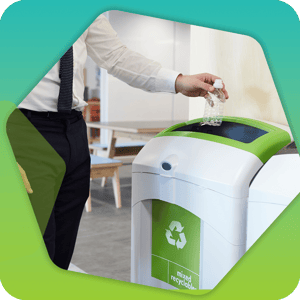
If the venue is in a conducive and cost-optimum geographic location but doesn’t have accreditation, you can explicitly include precise sustainability requirements in your RFPs and contracts and even send them in advance for better negotiations.

Hosting an eco-friendly event often begins with your vendor network. Whether you are looking for catering services, marketing materials, or event decor, many sustainable vendors are available to help you minimize waste, reduce your event's environmental impact, and support environmental initiatives.
Find sustainable vendors by researching companies that specialize in eco-friendly products and services. These companies will have well-documented ESG initiatives, from using recycled paper products, biodegradable materials, and renewable energy solutions to providing locally sourced food and beverages. You can also research whether the vendors are members of the Green Business Bureau, which indicates the organization is committed to green materials, clean transportation, and low-to-no waste practices.
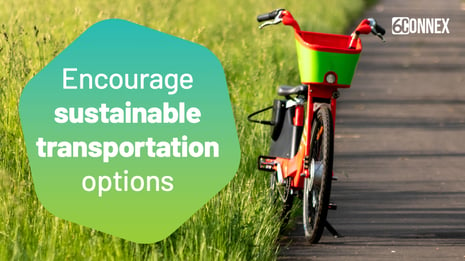
Transportation is a significant contributor to an event's carbon footprint, making it an important area to consider when creating a sustainable event. To reduce the environmental impact of your event, consider offering sustainable transportation options such as shuttle services, carpooling, or public transportation.
Shuttle services can be a convenient and sustainable transportation option for events, mainly if your venue is in a city or an area with limited parking. By providing shuttle services, you can help reduce traffic and parking congestion, as well as the environmental impact of your event. Carpooling is another sustainable transportation option, as it allows attendees to share rides and reduce the number of vehicles on the road. Consider offering incentives or rewards for attendees who carpool to your event, such as discounted or free parking.
Public transportation is another sustainable option, as it allows attendees to travel to your event using mass transit rather than driving alone. If your event is near a public transportation hub, consider providing information and resources to help attendees take advantage of this option.

Marketing materials and hand-outs such as brochures, flyers, banners, and swag can create a lot of waste at events. To reduce your event's environmental impact, consider using eco-friendly marketing materials such as recycled paper, biodegradable materials, or digital downloads, which use fewer natural resources and generate less waste than traditional paper. Biodegradable materials, including cornstarch-based plastics and cotton lanyards, are also a sustainable option. These materials can be broken down by natural processes, reducing waste and minimizing environmental impact.
Regardless of the type of collateral and swag you are giving away at your event, try to work with companies that not only use eco-friendly materials but also work to reduce their carbon footprints, such as plantable pencils, digital gift cards, or recycled plastic reusable bottles. These companies can remain sustainable through green manufacturing and production processes and/or by purchasing carbon offsets. Remember, too, that you can forgo swag and donate to animal conservation or environmental causes for prizes and giveaways.
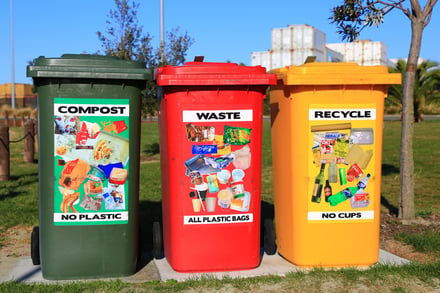
Reducing waste is an essential part of creating a sustainable event, and there are many initiatives you can implement to minimize waste and improve your event's environmental impact. Some waste reduction initiatives include digital collateral, composting, recycling, and using reusable or biodegradable products.
Instead of handing out brochures and pamphlets, consider creating a QR code for all your digital downloads. You can create specific QR codes for each marketing material you want. This also allows you to track data on who downloaded what and which material was accessed more than others.
Composting is a process in which organic materials such as leftover food are broken down into a soil-like substance that can be used as a natural fertilizer. You can divert organic waste from landfills by implementing a composting program at your event. Still trying to figure out where to start? BioCycle, a global authority on organic recycling, has a composting guide specifically for events that provide best practices. Remember, too, that unused food and beverages can also be donated. Look for a catering partner willing to supply sealed, unused food and beverage products to local charities, such as a food bank or shelter.
Recycling is another important waste reduction initiative, as it allows you to divert materials such as paper, plastic, and metal from landfills and repurpose them for other uses. Reusable products, such as water bottles (be sure to provide a water dispenser!) and tote bags, reduce the need for disposable items, and biodegradable products, such as compostable cups and utensils, can be broken down by natural processes, minimizing waste.
Consider using living herb centerpieces and potted plants for table decor and then allowing attendees to take the centerpieces home. Also, if your event venue doesn't provide furniture, linens, tableware, etc., be sure to rent materials rather than purchase them. Bonus: this will also be cheaper!

Energy consumption is a significant contributor to the environmental impact of events, making it essential to use energy-efficient lighting and equipment. Energy-efficient lighting, such as LED lights, uses less energy and produces less heat than traditional lighting options. Bonus: it also provides more consistent and brighter lighting for your event space. Energy-efficient equipment, such as Energy Star-certified electronics, is also a sustainable option, as it uses less energy and reduces greenhouse gas emissions.
In addition to using energy-efficient lighting and equipment, there are other ways to reduce energy consumption at your event. One way is to turn off equipment and lights when not in use, which can help reduce energy waste. Be sure to provide the event venue with your event schedule, so heating, air conditioning, and lighting are scheduled appropriately. Consider using natural lighting or solar power to reduce your event's energy consumption.
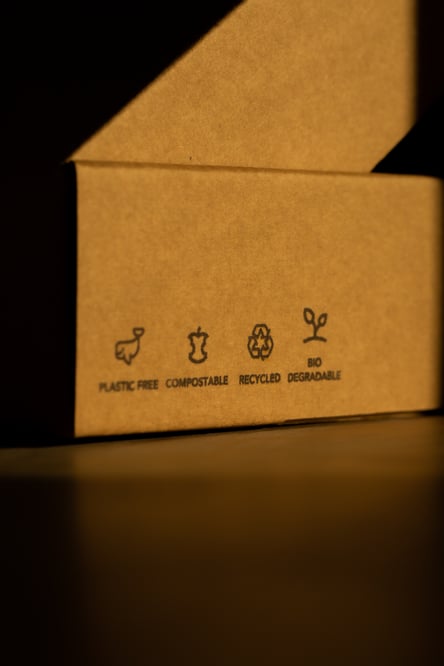
Food and beverage choices can have a significant impact on the sustainability of an event. Some sustainable food and beverage options include locally sourced and organic items, plant-based options, and reusable or compostable serving ware.
Require caterers to contribute to meeting your event's sustainability goals and select caterers that serve locally sourced and organic food and beverages. In addition to supporting local businesses, serving locally sourced and organic items is more sustainable than non-organic and imported products, as they are grown using fewer pesticides and chemicals and have a smaller carbon footprint due to the reduced transportation distance. Plant-based options, such as vegetarian or vegan meals, are also sustainable, as they have a lower environmental impact than meat-based options.
Finally, opt for plated options rather than buffets. Plated options enable the caterer to plan for appropriate quantities, reducing waste and improving hygiene in a post-pandemic world. Your caterer should also avoid boxed meals and serve condiments in bulk rather than use individual packaging.
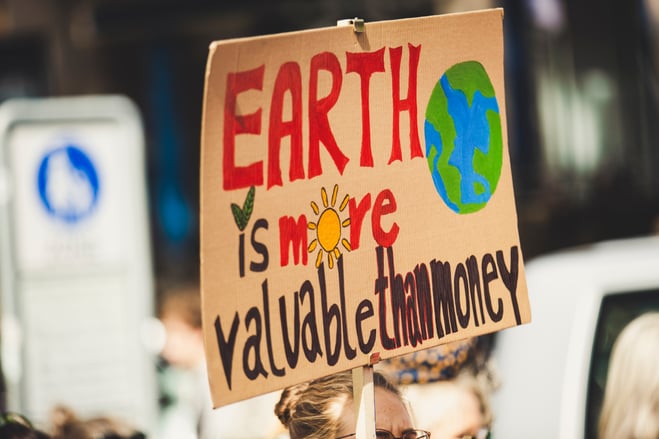
Promoting sustainability education and awareness is another important way to create a sustainable event. By hosting expert-led workshops or talks on sustainability topics such as renewable energy, waste reduction, and eco-friendly living, you can help educate attendees about the importance of sustainability and inspire them to make more environmentally responsible choices.
Also, consider incorporating sustainability messaging into your event materials and marketing, such as displaying sustainability messages or logos on event signage or including sustainability themes in your event branding. You can provide an option for your attendees to access a special sustainability badge at your events by having them sign a sustainability pledge. The pledge can involve a commitment from the attendees that they will do what you list in the pledge to be sustainable; this can include the promise to use digital downloads and digital business cards, choose sustainable food options, travel responsibly, perform acts of kindness, etc.
Finally, be sure to let your attendees know about your sustainability goals. Include them in your pre-event communications, social media, advertising, etc., and showcase how you work to achieve them. Get your attendees excited about sustainability and ensure they understand their role during and after your event.
Pro tip: Don't forget about post-show opportunities as part of your promotion. Partner up with a carbon footprint consultant so you can publish your carbon footprint savings via a social post, on their website, in an email campaign, etc.

Carbon offsetting is a way to mitigate the environmental impact of your event by investing in renewable energy or carbon reduction projects. By supporting organizations that work to reduce carbon emissions or investing in renewable energy projects, you can offset the carbon emissions generated by your event. Consider including an optional fee in your registration process to encourage attendees to offset their carbon emissions and partner with a trusted initiative such as Terrapass or the UN.
In addition to offsetting carbon emissions, you can donate to organizations that promote sustainability and environmental protection. These organizations may focus on various issues, such as climate change, renewable energy, or conservation efforts. By donating to these organizations, you can support their efforts and contribute to a more sustainable future.
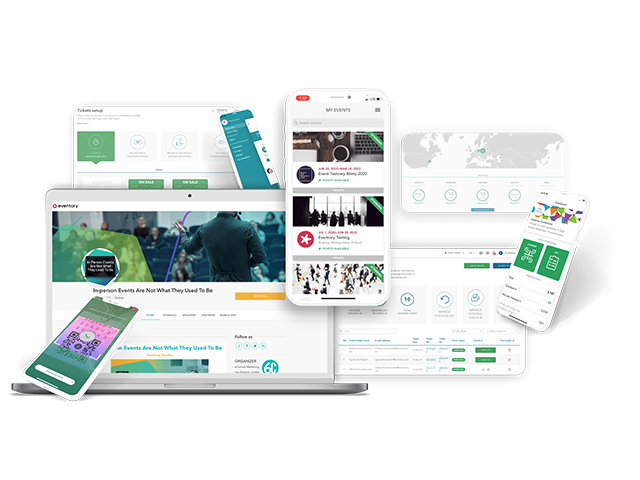
In addition to implementing sustainable event practices, incorporating end-to-end event technology can also modernize the overall event experience while promoting sustainability. For example, 6Connex offers a mobile event app that allows attendees to participate in events virtually, providing marketing materials in a digital format and migrating marketing and promotion activities such as email and social media online. Moreover, Eventory can help you reduce waste by facilitating e-tickets, digital badging, QR codes, and digital program guides.
Each year, around 5 trillion plastic bags are produced globally, with a single bag taking nearly 1,000 years to decompose. In 2021, the U.S. alone generated over 51 million tons of plastic waste—primarily wrappers, bottles, and bags—but only 5% was recycled. The remaining 95% ended up polluting landfills and oceans.

In-person events have long been criticized for their plastic waste, including items like utensils, Styrofoam cups, and drinking straws. To make your events more eco-friendly, consider these strategies:
Besides reducing ecological impact, such practices will also help reduce the cost of future events by preventing repeat purchases. Additionally, you can share recycling success stories on your event website to inform and encourage visitors to adopt event sustainability practices.
Reconsider your event design: An effective event sustainability practice is opting for an event format that can meet the required outcome with the least carbon intensity. Consider hosting virtual or hybrid events.
A 2021 American study found that transitioning from in-person to virtual events can help reduce carbon footprint by over 94% and energy consumption by 90%, and that’s a lot of footprints! Statistics further indicate that organizing a one-day international conference with 5000+ virtual attendees can reduce the event’s carbon emissions equivalent to the annual emissions of over 158 American households.
carbon footprint by over 94% and energy consumption by 90%, and that’s a lot of footprints! Statistics further indicate that organizing a one-day international conference with 5000+ virtual attendees can reduce the event’s carbon emissions equivalent to the annual emissions of over 158 American households.
Instill carbon-friendly practices: While virtual events are incredibly sustainable, internet usage and the uploading and downloading of data (streaming, video calls, etc.) can still emit some greenhouse gases. You can shrink your event’s environmental impact further by instilling the following carbon-friendly practices:
Moreover, in case of a large-scale international event, consider having regional hubs rather than bringing in people from all over to one location. It can largely reduce the carbon emissions caused by air travel while allowing the benefits from in-person participation.
6Connex is a leading virtual event platform that can help you plan and execute a successful and sustainable event. From choosing an eco-friendly venue and partnering with sustainable vendors to offering sustainable transportation options and implementing waste-reduction initiatives, 6Connex can handle all aspects of event planning to make the process easier and more efficient.
In addition to providing sustainable virtual event environments, 6Connex offers virtual event engagement tools to enhance the attendee experience and drive event success. These include mobile event apps, gamification features, digital ticketing, registration, and badging. Read our free How To Make Your Hybrid Event More Sustainable for the inside scoop.
6Connex has helped many brands successfully plan and execute sustainable events, including The Anxiety and Depression Association of America and the University of Edinburgh. Whether you're planning a virtual, hybrid, or in-person event, 6Connex can work with your marketing and event-planning team to create a sustainable and memorable experience for your attendees.
To learn more about how 6Connex can help with your sustainable event planning, request a virtual event platform demo or use the resources on our site to discover why companies have made 6Connex their number-one event coordinator. Our highly trained professional staff team is available to answer your questions while walking you through every aspect of the platform.
Dive into the future of events with our insightful webinar, "Embracing AI in Events: Navigating Opportunities and Challenges,". Join our esteemed speakers: Dahlia El Gazzar - Founder of DAHLIA+ Agency, Stephen Kaufman - Chief Product Officer at Inriver, and Henry Tran - CTO at 6Connex
Explore the transformative potential of AI in event planning, and engagement, and the challenges it may bring. Stay informed and inspired as we navigate the thrilling opportunities and challenges that AI brings to the dynamic world of events.
6Connex is the leading provider of in-person, hybrid, and virtual event technology for enterprises worldwide. Our cloud-based product portfolio includes event management tools, in-person event apps, virtual venues, webinars, learning management, and more.
From internal meetings to large scale conferences, we allow you to engage and transform big ideas into real-world results.
425 Soledad St.
Suite #500
San Antonio, TX 78205
1.800.395.4702
Australia: +61.2.72294013
Brazil: +55.11.4375.3555
United Kingdom: +44.20.37447284
United States: +1.210.890.5769